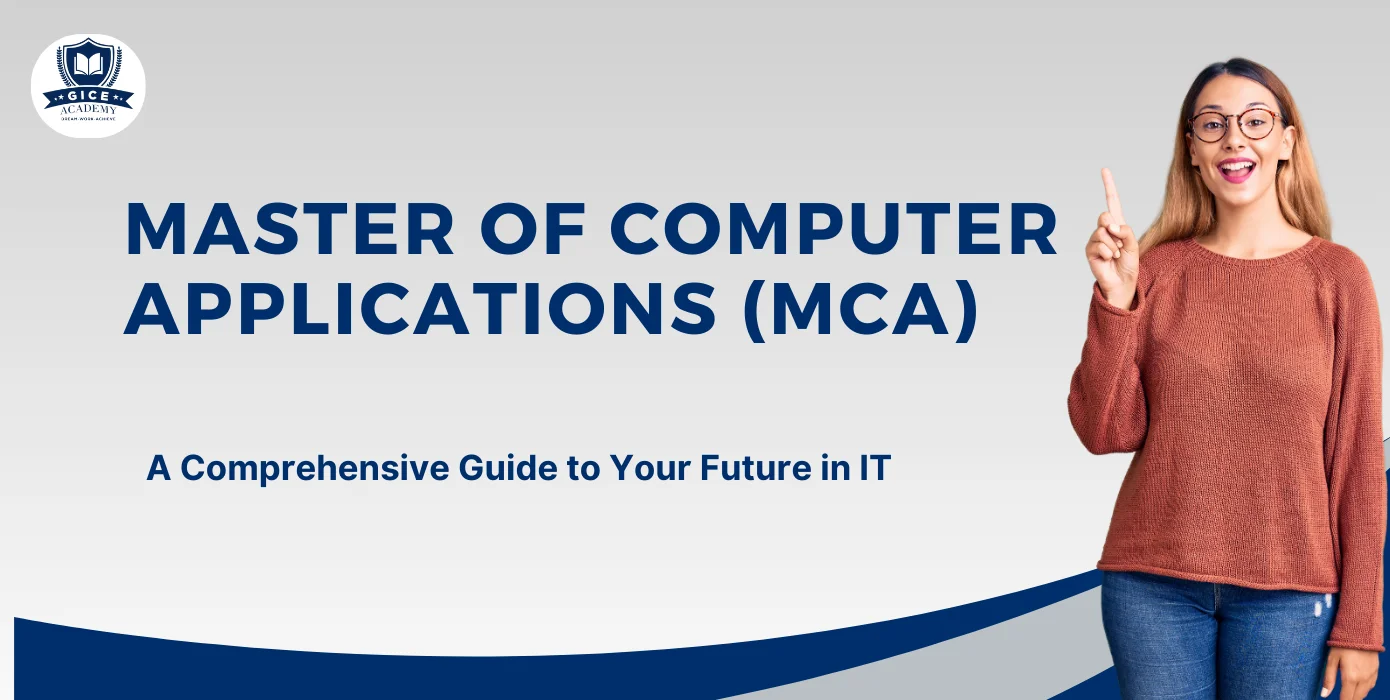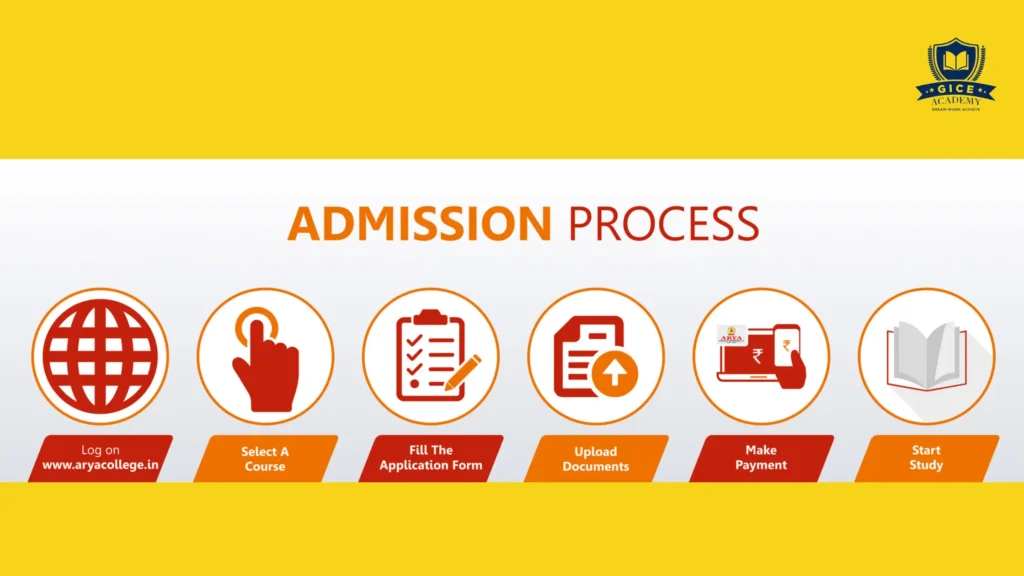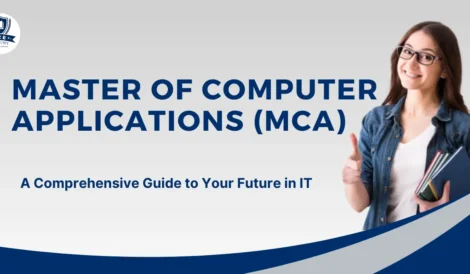Table of Contents
The Master of Computer Applications (MCA) is a prestigious postgraduate degree aimed at providing in-depth knowledge and expertise in computer science and applications. It is designed for individuals who aspire to build successful careers in the IT industry. This comprehensive guide covers everything you need to know about the MCA course, including its structure, eligibility criteria, admission process, curriculum, career opportunities, and much more.
What is the MCA Course?
The Master of Computer Applications (MCA) is a three-year postgraduate program focused on developing the technical skills and knowledge required to excel in the field of computer science and information technology. The course is structured to provide a balanced mix of theoretical knowledge and practical experience, preparing students for the challenges of the IT industry.
Objectives of the MCA Course

- To provide a solid foundation in computer science concepts and applications.
- To develop problem-solving and analytical skills through hands-on projects and real-world scenarios.
- To prepare students for various roles in the IT industry, such as software developers, system analysts, and IT managers.
- To encourage continuous learning and professional development in the ever-evolving field of technology.
Eligibility Criteria
To pursue an MCA course, candidates must meet certain eligibility requirements. These criteria ensure that students have the necessary background and skills to succeed in the program.
Educational Qualifications
- Undergraduate Degree:
- Candidates must have a bachelor’s degree in computer applications (BCA), computer science, or a related field.
- Alternatively, candidates with a bachelor’s degree in science (B.Sc), commerce (B.Com), or arts (B.A) with Mathematics as a subject at 10+2 level or during graduation can also apply.
- Minimum Marks:
- Most institutions require candidates to have a minimum aggregate of 50% marks in their undergraduate degree. However, this percentage may vary across different institutions.
Additional Requirements
- Some institutions may conduct entrance exams or interviews to assess the candidate’s aptitude and suitability for the MCA program.
Admission Process
The admission process for the MCA course varies across institutions. Here’s a general overview of the common procedures:
Entrance Exams
Many institutions conduct their own entrance exams for MCA admissions. Some of the popular entrance exams include:
- NIMCET (NIT MCA Common Entrance Test):
- Conducted by National Institutes of Technology (NITs) for admission to their MCA programs.
- MAH MCA CET (Maharashtra MCA Common Entrance Test):
- Conducted by the Directorate of Technical Education, Maharashtra, for admission to MCA programs in the state.
- TANCET (Tamil Nadu Common Entrance Test):
- Conducted by Anna University for admission to MCA programs in Tamil Nadu.
- Other University-Specific Exams:
- Several universities conduct their own entrance exams for MCA admissions.
Application Process

- Registration:
- Visit the official website of the entrance exam or the institution and register with your basic details to create an account.
- Filling the Application Form:
- Log in with your credentials and fill in the application form with accurate personal, educational, and contact details.
- Uploading Documents:
- Upload scanned copies of required documents such as passport-sized photograph, signature, and academic certificates.
- Payment of Application Fees:
- Pay the application fee online through net banking, credit/debit card, or other available payment methods.
- Submission:
- Review all the details carefully and submit the application form.
Merit-Based Admission
Some institutions offer admissions based on the merit of the qualifying degree. Candidates with a high aggregate percentage in their undergraduate degree may be eligible for direct admission.
Counseling Process
After the entrance exams, institutions may conduct a counseling process to allot seats based on the candidates’ scores and preferences. The counseling process typically involves the following steps:
- Registration for Counseling:
- Candidates need to register for the counseling process on the institution’s official website.
- Choice Filling:
- Candidates fill in their preferred courses and institutions based on their entrance exam scores and interests.
- Document Verification:
- Attend the document verification process with original certificates and documents.
- Seat Allotment:
- Seats are allotted based on the rank, preferences, and availability.
- Admission:
- Complete the admission formalities by paying the fees and submitting the required documents at the allotted institute.
MCA Curriculum and Course Structure

The MCA curriculum is designed to provide a comprehensive understanding of computer applications and technology. It covers a wide range of subjects, from basic programming to advanced technologies, ensuring that graduates are well-prepared for the demands of the IT industry.
Key Dates and Timeline for the MCA Exam: Everything You Need to Know
Candidates can optimize their preparation for the MCA 2024 Exam by considering MCA Crash Course or MCA Coaching Classroom Programme options. These avenues provide study notes and a comprehensive guide for a thorough preparation.
Course Duration
The MCA program is typically spread over three years, divided into six semesters.
Core Subjects
- Programming Languages:
- Basics and advanced concepts of programming languages such as C, C++, Java, and Python.
- Database Management Systems (DBMS):
- Relational databases, SQL, and NoSQL databases.
- Concepts of normalization, indexing, and transactions.
- Computer Networks:
- Understanding the architecture, protocols, and security of computer networks.
- Software Engineering:
- Software development life cycle (SDLC).
- Agile methodologies, software testing, and project management.
- Web Technologies:
- Front-end and back-end web development.
- HTML, CSS, JavaScript, and server-side scripting languages.
- Operating Systems:
- Functions and structure of modern operating systems.
- Process management, memory management, and file systems.
- Data Structures and Algorithms:
- Different types of data structures like arrays, stacks, queues, linked lists, and trees.
- Algorithms for manipulating these data structures.
Elective Subjects
- Data Science:
- Techniques and tools for analyzing and interpreting large datasets.
- Artificial Intelligence and Machine Learning:
- Concepts and applications of AI and ML algorithms.
- Cybersecurity:
- Protecting information systems from cyber threats.
- Implementing security measures and responding to security incidents.
- Cloud Computing:
- Concepts of cloud infrastructure and services.
- Deployment and management of applications on cloud platforms.
- Mobile Application Development:
- Creating applications for mobile devices on platforms like Android and iOS.
Projects and Internships
The MCA program includes projects and internships to provide hands-on experience and exposure to real-world applications and industry practices.
- Major Project:
- Students work on a significant project that integrates the knowledge and skills acquired during the course.
- Projects often involve real-world problems and collaboration with industry partners.
- Internship:
- Mandatory internships provide practical exposure and industry experience.
- Internships are typically undertaken in IT companies, research organizations, or startups.
Industry-Relevant Skills

The MCA curriculum is designed to equip students with a blend of technical and soft skills essential for the IT industry.
- Technical Skills:
- Proficiency in multiple programming languages.
- Knowledge of software development tools and platforms.
- Understanding of modern technologies and frameworks.
- Soft Skills:
- Communication skills for effective collaboration and presentation.
- Problem-solving and analytical thinking.
- Teamwork and project management abilities.
Career Opportunities after MCA
An MCA degree opens up a multitude of career opportunities in various sectors. Here are some potential career pathways for MCA graduates:
IT and Software Development
- Software Developer/Engineer:
- Designing, coding, and testing software applications.
- Working on software development projects in various domains like finance, healthcare, and education.
- System Analyst:
- Analyzing business requirements and designing information systems to meet those needs.
- Bridging the gap between business and technical teams.
- Web Developer:
- Developing and maintaining websites and web applications.
- Working with front-end and back-end technologies.
- Mobile App Developer:
- Creating applications for mobile devices on platforms like Android and iOS.
- Ensuring app functionality, usability, and performance.
Data and Analytics
- Data Scientist:
- Analyzing large datasets to extract insights and inform decision-making.
- Utilizing statistical and machine learning techniques.
- Database Administrator:
- Managing and maintaining database systems.
- Ensuring data integrity, security, and availability.
Network and Security
- Network Administrator:
- Overseeing and managing an organization’s network infrastructure.
- Ensuring network security, performance, and reliability.
- Cybersecurity Analyst:
- Protecting information systems from cyber threats.
- Implementing security measures and responding to security incidents.
Management and Consulting
- IT Manager:
- Overseeing IT operations and strategy within an organization.
- Managing IT projects and teams.
- IT Consultant:
- Advising organizations on technology solutions to improve business processes.
- Implementing and managing IT systems and infrastructure.
Academia and Research
- Lecturer/Professor:
- Teaching computer science and related subjects at colleges and universities.
- Conducting research in specialized areas of computer science.
- Research Scientist:
- Working in research institutions to develop new technologies and solutions.
- Publishing findings in scientific journals and conferences.
Further Studies and Certifications for MCA Graduates

Higher Education
- PhD in Computer Applications:
- MCA graduates can pursue a PhD in Computer Applications or related fields, focusing on research and academic careers.
- MBA in IT Management:
- An MBA with a specialization in IT management can open up leadership and executive roles in the industry.
Professional Certifications
- Certified Data Scientist:
- Certification programs in data science and analytics from recognized institutions.
- Certified Ethical Hacker (CEH):
- Certification for professionals specializing in cybersecurity and ethical hacking.
- Cloud Certifications:
- Certifications from cloud service providers like AWS, Google Cloud, and Microsoft Azure.
Preparation Tips for MCA Entrance Exams
Effective preparation is crucial for success in MCA entrance exams. Here are some tips and strategies to help you prepare:
Study Materials and Resources
- Books:
- Refer to standard books on programming languages, data structures, algorithms, and other core subjects.
- Use MCA entrance exam preparation books and guides.
- Online Resources:
- Utilize online platforms offering mock tests, practice papers, and video tutorials.
- Previous Year Papers:
- Solving previous year question papers helps in understanding the exam pattern and types of questions asked.
Time Management Strategies
- Create a Study Plan:
- Allocate specific time slots for each subject and stick to the schedule.
- Regular Breaks:
- Take regular breaks to avoid burnout and maintain productivity.
- Revision:
- Regularly revise the topics you have studied to retain information better.
Tips for Each Subject
- Mathematics:
- Practice problems regularly to improve speed and accuracy.
- Focus on understanding the concepts rather than rote learning.
- Logical Reasoning:
- Solve puzzles and logical reasoning questions to enhance analytical thinking.
- Computer Awareness:
- Stay updated with basic computer science concepts and recent technological advancements.
- General Awareness:
- Read newspapers and magazines to improve general knowledge and current affairs awareness.
Career Pathways After MCA

An MCA degree opens up a multitude of career opportunities in various sectors. Here are some potential career pathways for MCA graduates:
IT and Software Development
- Software Developer/Engineer:
- Designing, coding, and testing software applications.
- Working on software development projects in various domains like finance, healthcare, and education.
- System Analyst:
- Analyzing business requirements and designing information systems to meet those needs.
- Bridging the gap between business and technical teams.
- Web Developer:
- Developing and maintaining websites and web applications.
- Working with front-end and back-end technologies.
- Mobile App Developer:
- Creating applications for mobile devices on platforms like Android and iOS.
- Ensuring app functionality, usability, and performance.
Data and Analytics
- Data Scientist:
- Analyzing large datasets to extract insights and inform decision-making.
- Utilizing statistical and machine learning techniques.
- Database Administrator:
- Managing and maintaining database systems.
- Ensuring data integrity, security, and availability.
Network and Security
- Network Administrator:
- Overseeing and managing an organization’s network infrastructure.
- Ensuring network security, performance, and reliability.
- Cybersecurity Analyst:
- Protecting information systems from cyber threats.
- Implementing security measures and responding to security incidents.
Management and Consulting
- IT Manager:
- Overseeing IT operations and strategy within an organization.
- Managing IT projects and teams.
- IT Consultant:
- Advising organizations on technology solutions to improve business processes.
- Implementing and managing IT systems and infrastructure.
Academia and Research
- Lecturer/Professor:
- Teaching computer science and related subjects at colleges and universities.
- Conducting research in specialized areas of computer science.
- Research Scientist:
- Working in research institutions to develop new technologies and solutions.
- Publishing findings in scientific journals and conferences.
Further Studies and Certifications for MCA Graduates
Higher Education
- PhD in Computer Applications:
- MCA graduates can pursue a PhD in Computer Applications or related fields, focusing on research and academic careers.
- MBA in IT Management:
- An MBA with a specialization in IT management can open up leadership and executive roles in the industry.
Professional Certifications
- Certified Data Scientist:
- Certification programs in data science and analytics from recognized institutions.
- Certified Ethical Hacker (CEH):
- Certification for professionals specializing in cybersecurity and ethical hacking.
- Cloud Certifications:
- Certifications from cloud service providers like AWS, Google Cloud, and Microsoft Azure.
Crash Course: Enroll in a crash course three months prior to the MCA exam to acquire intensive practice and learn valuable tricks and shortcuts. GICE ACADEMY offers a Crash Course specifically designed to enhance your understanding of concepts and improve your speed.
FAQ
Can I pursue an MCA after a non-computer science undergraduate degree?
Yes, candidates with a bachelor’s degree in science (B.Sc), commerce (B.Com), or arts (B.A) with Mathematics as a subject at 10+2 level or during graduation can pursue MCA.
What are the job prospects after completing an MCA course?
MCA graduates have excellent job prospects in various sectors including IT and software development, data analytics, network administration, cybersecurity, and IT management.
What is the duration of the MCA course?
The MCA course typically spans three years, divided into six semesters.
What are the key skills required for a successful career in IT after MCA?
Key skills include proficiency in programming languages, understanding of software development methodologies, problem-solving abilities, and good communication skills.
How can I improve my coding skills for MCA?
Practice regularly on coding platforms like HackerRank, LeetCode, and CodeChef. Participate in coding competitions and work on real-life projects.





